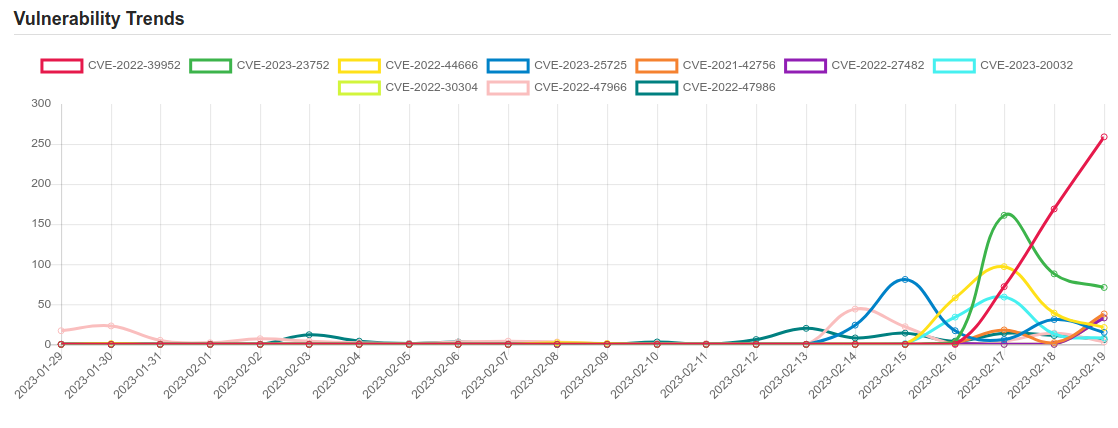Daily Vulnerability Trends: Mon Feb 20 2023

| CVE NAME | CVE Description |
| CVE-2022-27482 | A improper neutralization of special elements used in an os command (‘os command injection’) in Fortinet FortiADC version 7.0.0 through 7.0.1, 6.2.0 through 6.2.2, 6.1.0 through 6.1.6, 6.0.x, 5.x.x allows attacker to execute arbitrary shell code as `root` via CLI commands. |
| CVE-2023-20032 | No description provided |
| CVE-2022-30304 | An improper neutralization of input during web page generation vulnerability [CWE-79] in FortiAnalyzer versions prior to 7.2.1, 7.0.4 and 6.4.8 may allow a remote unauthenticated attacker to perform a stored cross site scripting (XSS) attack via the URL parameter observed in the FortiWeb attack event logview in FortiAnalyzer. |
| CVE-2022-47966 | Multiple Zoho ManageEngine on-premise products, such as ServiceDesk Plus through 14003, allow remote code execution due to use of Apache xmlsec (aka XML Security for Java) 1.4.1, because the xmlsec XSLT features, by design in that version, make the application responsible for certain security protections, and the ManageEngine applications did not provide those protections. |
| CVE-2022-47986 | IBM Aspera Faspex 4.4.2 Patch Level 1 and earlier could allow a remote attacker to execute arbitrary code on the system, caused by a YAML deserialization flaw. By sending a specially crafted obsolete API call, an attacker could exploit this vulnerability to execute arbitrary code on the system. The obsolete API call was removed in Faspex 4.4.2 PL2. IBM X-Force ID: 243512. |
| CVE-2020-28362 | Go before 1.14.12 and 1.15.x before 1.15.4 allows Denial of Service. |
| CVE-2023-23529 | No description provided |
| CVE-2022-25664 | Information disclosure due to exposure of information while GPU reads the data in Snapdragon Auto, Snapdragon Compute, Snapdragon Connectivity, Snapdragon Consumer IOT, Snapdragon Industrial IOT, Snapdragon Mobile, Snapdragon Wearables |
| CVE-2023-23376 | Windows Common Log File System Driver Elevation of Privilege Vulnerability |
| CVE-2022-45788 | A CWE-754: Improper Check for Unusual or Exceptional Conditions vulnerability exists that could cause arbitrary code execution, denial of service and loss of confidentiality & integrity when a malicious project file is loaded onto the controller. Affected Products: EcoStruxure™ Control Expert (All Versions), EcoStruxure™ Process Expert (Versions prior to V2020), Modicon M340 CPU – part numbers BMXP34* (All Versions), Modicon M580 CPU – part numbers BMEP* and BMEH* (All Versions), Modicon M580 CPU Safety – part numbers BMEP58*S and BMEH58*S (All Versions), Modicon Momentum Unity M1E Processor – 171CBU* (All Versions), Modicon MC80 – BMKC80 (All Versions), Legacy Modicon Quantum – 140CPU65* and Premium CPUs – TSXP57* (All Versions) |
| CVE-2022-45789 | A CWE-294: Authentication Bypass by Capture-replay vulnerability exists that could cause execution of unauthorized Modbus functions on the controller when hijacking an authenticated Modbus session. Affected Products: EcoStruxure™ Control Expert (All Versions), EcoStruxure™ Process Expert (Versions prior to V2020), Modicon M340 CPU – part numbers BMXP34* (All Versions), Modicon M580 CPU – part numbers BMEP* and BMEH* (All Versions), Modicon M580 CPU Safety – part numbers BMEP58*S and BMEH58*S (All Versions) |
| CVE-2019-0708 | A remote code execution vulnerability exists in Remote Desktop Services formerly known as Terminal Services when an unauthenticated attacker connects to the target system using RDP and sends specially crafted requests, aka ‘Remote Desktop Services Remote Code Execution Vulnerability’. |
| CVE-2022-42475 | A heap-based buffer overflow vulnerability [CWE-122] in FortiOS SSL-VPN 7.2.0 through 7.2.2, 7.0.0 through 7.0.8, 6.4.0 through 6.4.10, 6.2.0 through 6.2.11, 6.0.15 and earlier and FortiProxy SSL-VPN 7.2.0 through 7.2.1, 7.0.7 and earlier may allow a remote unauthenticated attacker to execute arbitrary code or commands via specifically crafted requests. |
| CVE-2023-21823 | Windows Graphics Component Remote Code Execution Vulnerability |
| CVE-2023-25194 | A possible security vulnerability has been identified in Apache Kafka Connect. This requires access to a Kafka Connect worker, and the ability to create/modify connectors on it with an arbitrary Kafka client SASL JAAS config and a SASL-based security protocol, which has been possible on Kafka Connect clusters since Apache Kafka 2.3.0. When configuring the connector via the Kafka Connect REST API, an authenticated operator can set the `sasl.jaas.config` property for any of the connector’s Kafka clients to “com.sun.security.auth.module.JndiLoginModule”, which can be done via the `producer.override.sasl.jaas.config`, `consumer.override.sasl.jaas.config`, or `admin.override.sasl.jaas.config` properties. This will allow the server to connect to the attacker’s LDAP server and deserialize the LDAP response, which the attacker can use to execute java deserialization gadget chains on the Kafka connect server. Attacker can cause unrestricted deserialization of untrusted data (or) RCE vulnerability when there are gadgets in the classpath. Since Apache Kafka 3.0.0, users are allowed to specify these properties in connector configurations for Kafka Connect clusters running with out-of-the-box configurations. Before Apache Kafka 3.0.0, users may not specify these properties unless the Kafka Connect cluster has been reconfigured with a connector client override policy that permits them. Since Apache Kafka 3.4.0, we have added a system property (“-Dorg.apache.kafka.disallowed.login.modules”) to disable the problematic login modules usage in SASL JAAS configuration. Also by default “com.sun.security.auth.module.JndiLoginModule” is disabled in Apache Kafka 3.4.0. We advise the Kafka Connect users to validate connector configurations and only allow trusted JNDI configurations. Also examine connector dependencies for vulnerable versions and either upgrade their connectors, upgrading that specific dependency, or removing the connectors as options for remediation. Finally, in addition to leveraging the “org.apache.kafka.disallowed.login.modules” system property, Kafka Connect users can also implement their own connector client config override policy, which can be used to control which Kafka client properties can be overridden directly in a connector config and which cannot. |
A considerable amount of time and effort goes into maintaining this website, creating backend automation and creating new features and content for you to make actionable intelligence decisions. Everyone that supports the site helps enable new functionality.
If you like the site, please support us on Patreon using the button below

To keep up to date follow us on the below channels.





